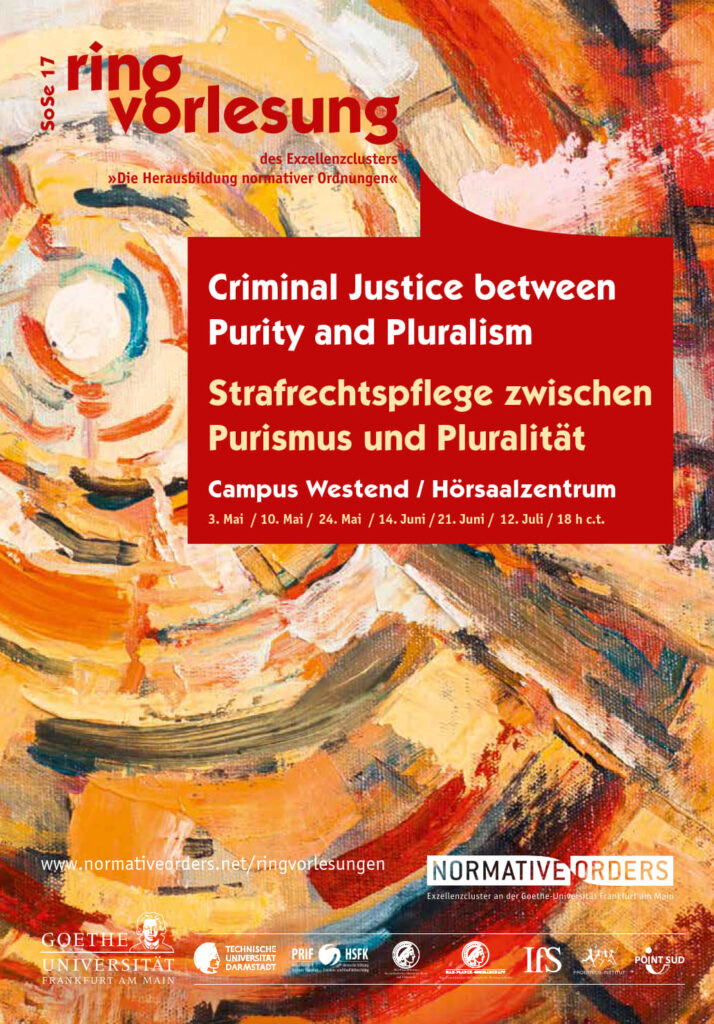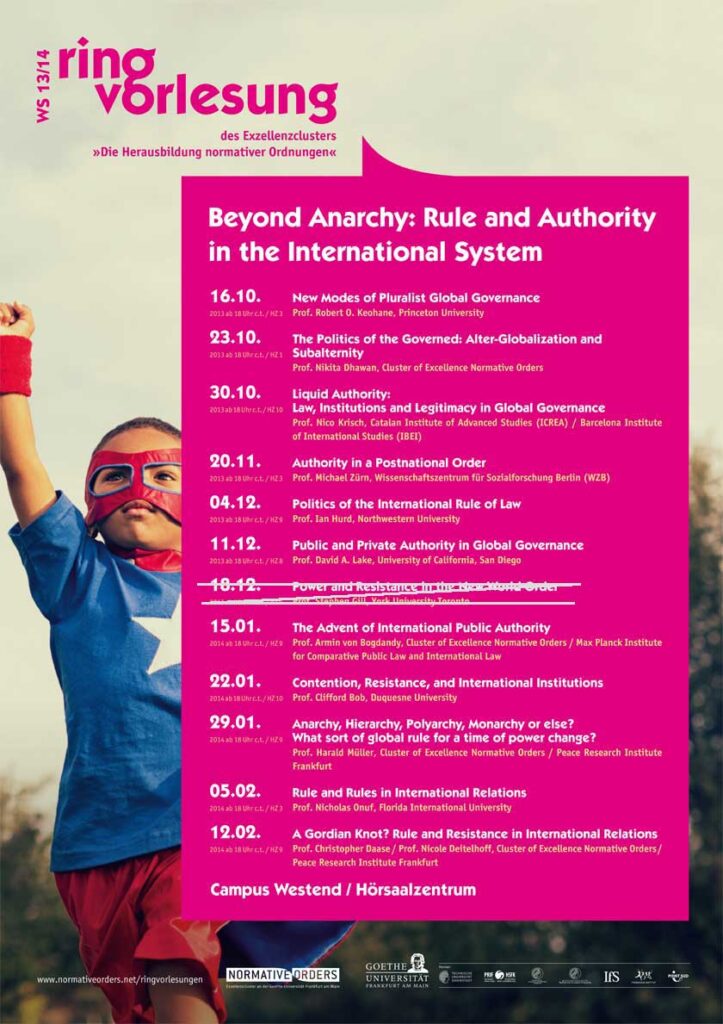Lecture series
In the lecture series, central aspects of the research work are dealt with, each from the perspective of one of the disciplines involved in the research center. The primary aim is to allow students, colleagues and other interested parties to participate in research and to invite them to join in the discussion.
Am Scheidepunkt? Zur Krise der Demokratie / At the crossroads? On the crisis of democracy
Winter semester 2025/26
Western democracies are at a crossroads: since the “turning point” proclaimed by German Chancellor Olaf Scholz in light of the Russian attack on Ukraine, the term has become a symbol of an era of upheaval. The current political and social situation is perceived in many places as a crisis of democracy – characterized by polarization, the rise of authoritarian movements, geopolitical tensions and the erosion of normative foundations of democratic orders.
The lecture series
The lecture series of the Research Centre Normative Orders in the winter semester 2025/2026 takes place as part of the research program “Zeitenwenden. Normative Orders in Transition?” funded by the Commerzbank Endowment Fund of the Stifterverband für die Deutsche Wissenschaft. It is organized by Thomas Biebricher, Rainer Forst, Martin Saar and Greta Wagner.
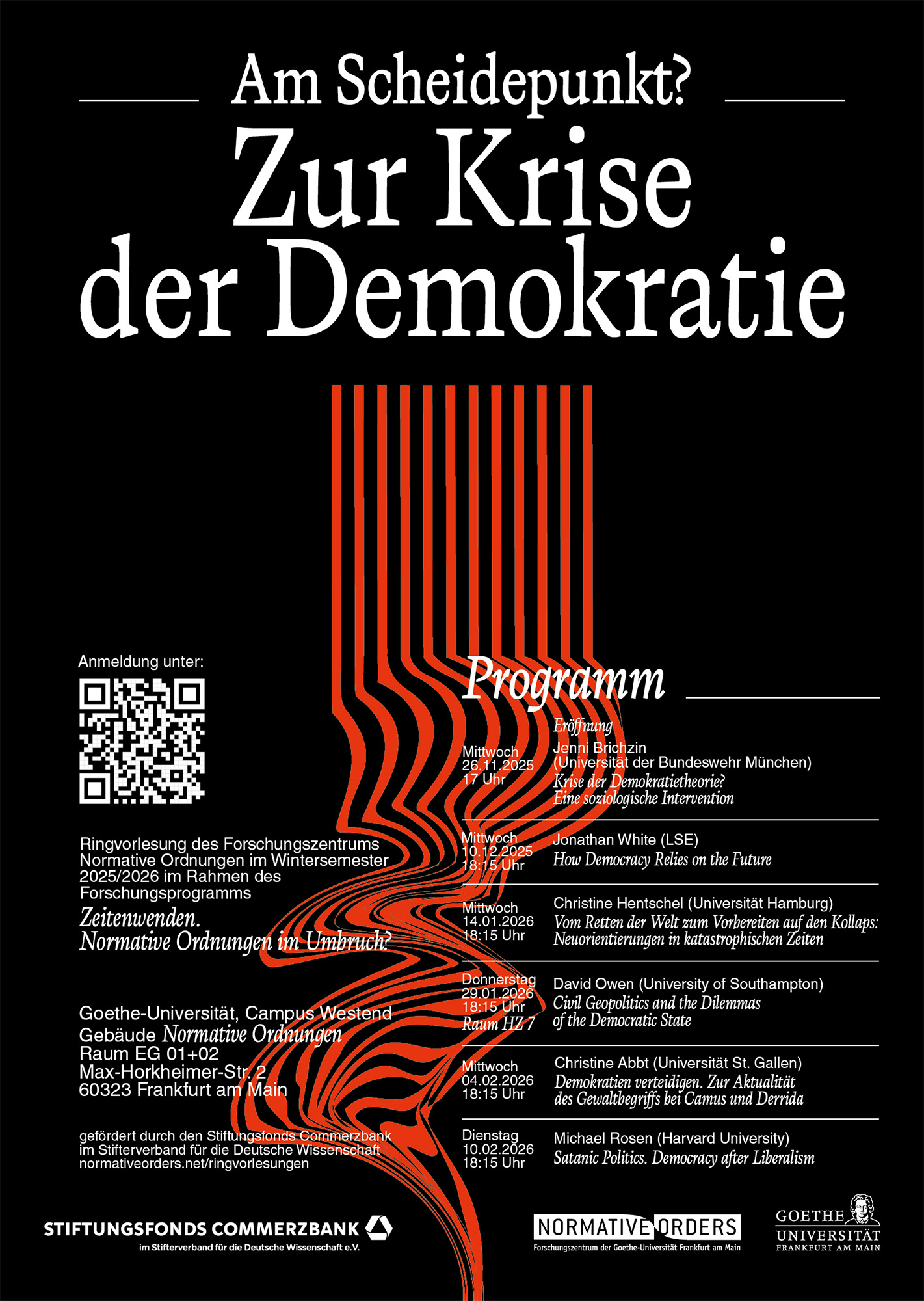
Racism in the police – empirical findings, methodological approaches and controversies
Summer semester 2025
Reports from people affected by racism about unprovoked police checks, humiliation or problematic use of force by the police continue unabated. They occupy the public debate; numerous political initiatives have been fighting for clarification, in some cases for decades. In recent years, empirical social research and police research have also increasingly taken up the issue.
Racism in the police has various dimensions – from individual attitudes to structural forms – and can be investigated in different ways. As part of the lecture series, researchers will present current empirical studies on racist attitudes and knowledge structures, institutional reproduction mechanisms of racism and the perspectives of those affected in three lectures.
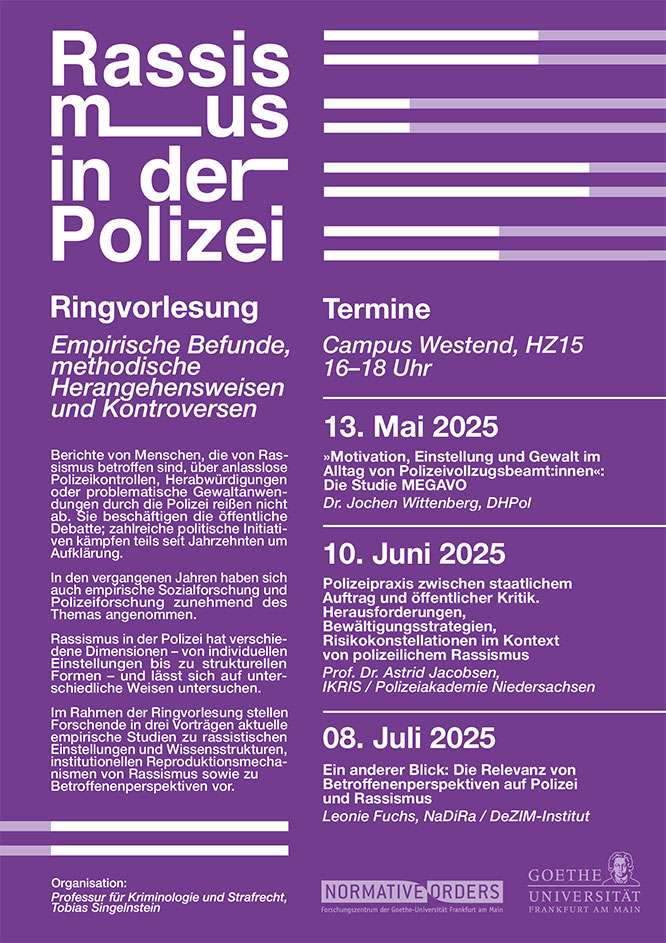
Climate in Court / Climate Contested. Interdisciplinary perspectives on law(s) in the ecological crisis
Winter semester 2023/24
The lecture series “Klima vor Gericht/Climate Contested. Interdisciplinary perspectives on law(s) in the ecological crisis” addresses the complex interplay between climate change and law. Lectures, panel discussions and debates will discuss from an interdisciplinary perspective how the law is struggling to deal with the ecological crisis.
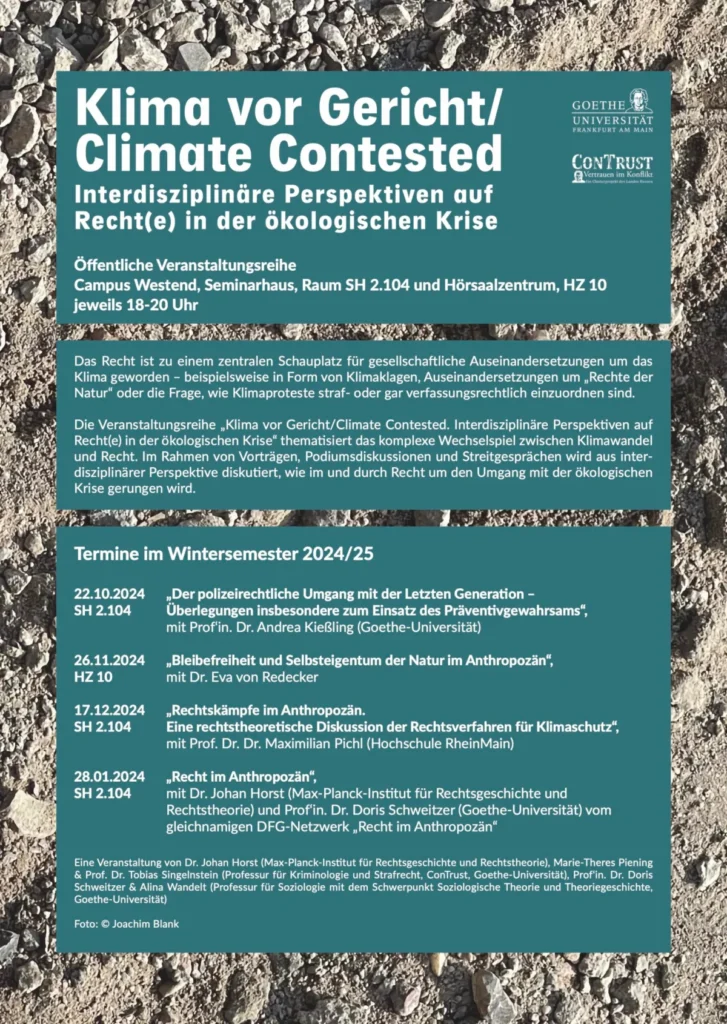
Climate crisis and criminal law
Winter semester 2023/24
The climate crisis also raises fundamental questions with regard to the theory and practice of criminal law. For example, the concept of “climate criminal law” (understood as climate protection criminal law) has recently been introduced into the criminal law discourse in order to explore the possibilities and limits of criminal law in climate protection.
If the concept of criminal climate law is understood in a broad sense, it serves as a guiding and key concept for the criminal justice system in times of increasingly crisis-ridden anthropogenic climate change. From this broad field, the diverse criminal law issues in connection with the climate protests of the “last generation”, which are omnipresent in the media, currently stand out in particular.
Under the title “Climate Crisis and Criminal Law”, the event, organized as a digital lecture series, will bring together speakers from Germany and abroad in three thematic blocks (Climate Protection Criminal Law – Climate Protests – Fundamentals) to shed light on selected aspects of the topic from different (e.g. dogmatic, criminological, legal-theoretical) perspectives.
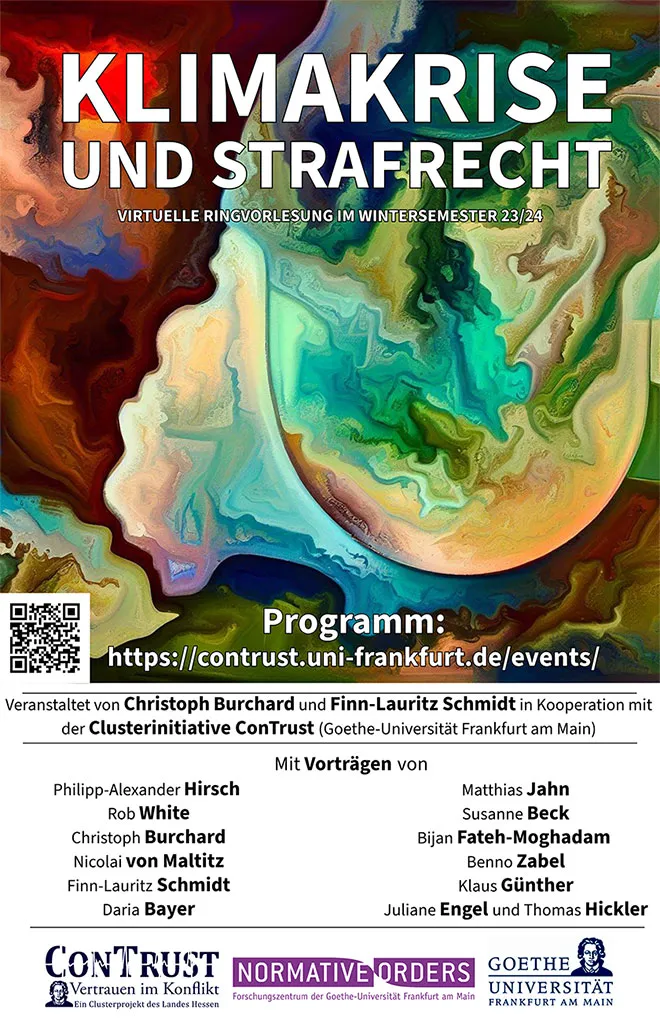
The building of democracy. The history, present and future of St. Paul’s Church as a political symbol
Summer semester 2023
Germany is not rich in places that can tell the story of democracy. St. Paul’s Church is the most symbolic German building in this respect. In 1848, the first freely elected parliament convened here with the aim of founding a democratic nation. After many compromises, a constitution was drawn up in 1849 – but it failed due to the balance of power at the time. What began as a revolution was crushed by reaction. St. Paul’s Church is therefore a dialectical political site: it bears witness to the attempts at democratic beginnings and foundations as well as the failure of the same, without the hope that it might one day succeed being extinguished. It is therefore the site of the unfinished history of German democracy. In the course of the upcoming 175th anniversary of the National Assembly in May 2023, a broad social debate will be held on the future of St. Paul’s Church. The aim is to renovate St. Paul’s Church in the coming years and turn it into a national place of remembrance and discourse by building a ‘House of Democracy’. The lecture series “Building of Democracy” aims to make a contribution to the current debate by shedding light on the associated topics in lectures and a concluding panel discussion. In addition to concrete discussions on the past, present and future of Frankfurt’s Paulskirche, the lecture series will fundamentally address the questions that this place of democratic history poses to us.
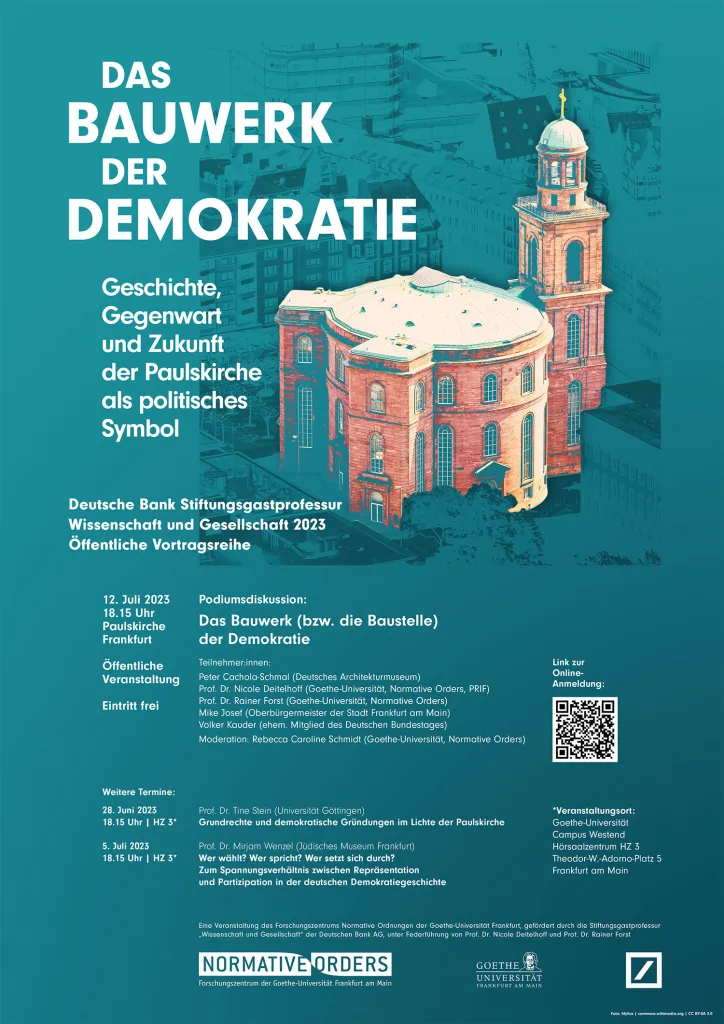
Algorithms // A Brave New World?
Winter semester 2022/23
Algorithms, Uncertainty and Risk
Summer semester 2022
While data sets used to be a tool for making predictions on how to deal with uncertainty, the so-called “algorithmic turn” is increasingly leading to a prediction society in which individual and group behavior is consistently evaluated on a large scale and the future is shaped on this basis. Instead of legal, institutional and individual processing and experience, probabilities and statistics now dominate. This makes the future more predictable on the one hand, but also more susceptible to events that are not covered by such predictions – e.g. because they occur too rarely or are caused by coincidence. At the same time, the control of (legal) decisions is changing, as it now has to look more closely at the decision-making process.
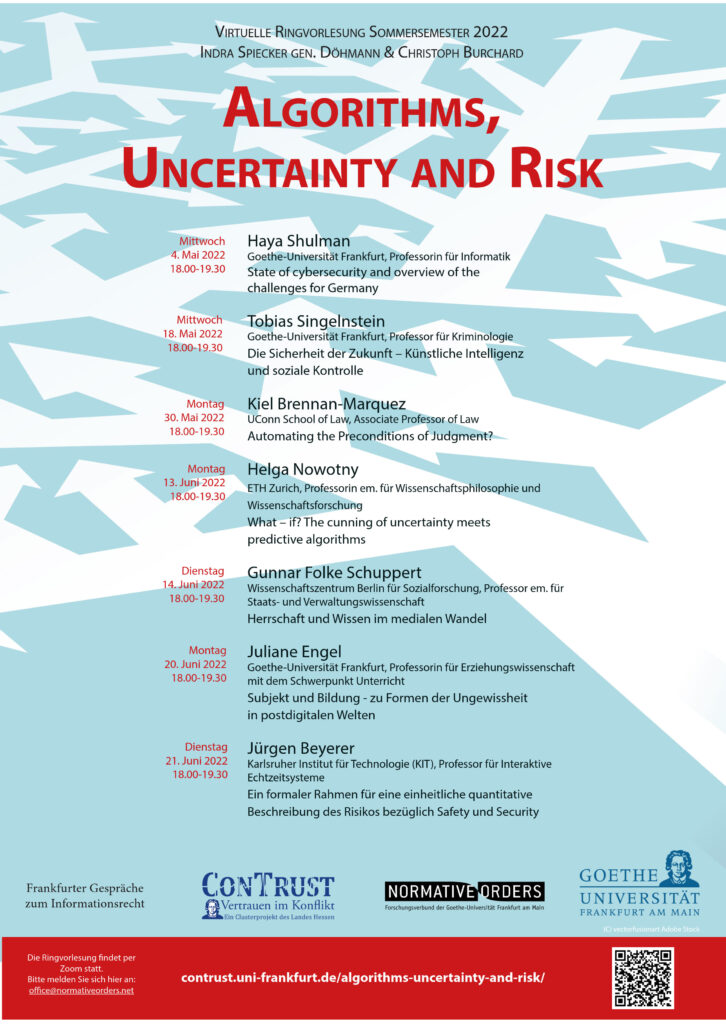
Algrithms and the transformation of democracy
Winter semester 2021/22
Algorithms – Between Trust and Control
Summer semester 2021
Shifting power through algorithms and AI
Winter semester 2020/21
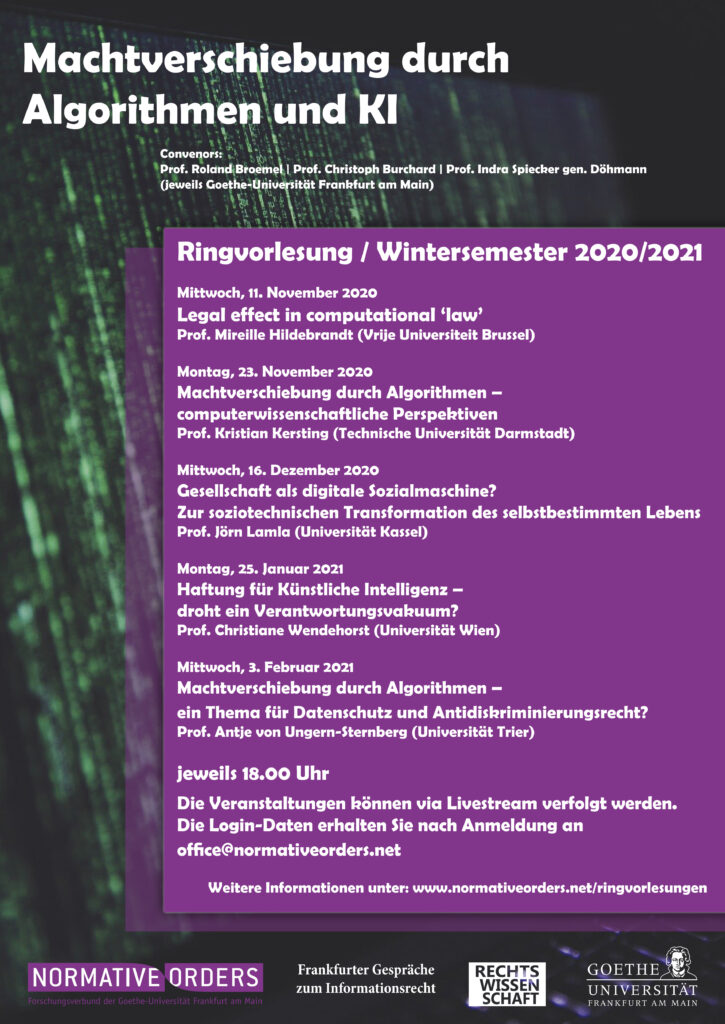
Liability law and artificial intelligence
Winter semester 2019/20
Rapid technical advances have been made in the field of artificial intelligence in recent years, which pose fundamental new challenges for private law in general and the liability regime in particular: Where autonomous systems and artificial neural networks such as self-driving cars or medical diagnostic tools are used, the focus of liability shifts from human behavior to machine actors. The legal system must address the specific risk potential of these autonomous technologies in a normative manner if it does not want to risk responsibility-free spaces and constantly growing liability gaps.
But to what extent do traditional liability law instruments offer appropriate solutions for damage caused by autonomous information systems and where has the digital species given rise to the need for new standards for risk management and control? These questions will be addressed in a series of four events featuring prominent, internationally renowned experts. Under what conditions, for example, can the manufacturer or operator be held liable for the behavior of the autonomous system? Can causal misconduct on the part of human actors be demanded at all or does the risk of digital decision-making autonomy require a strict basis for liability in the form of strict liability or vicarious liability? Or does the autonomous system itself become the responsible subject of liability by virtue of its own digital legal personality?
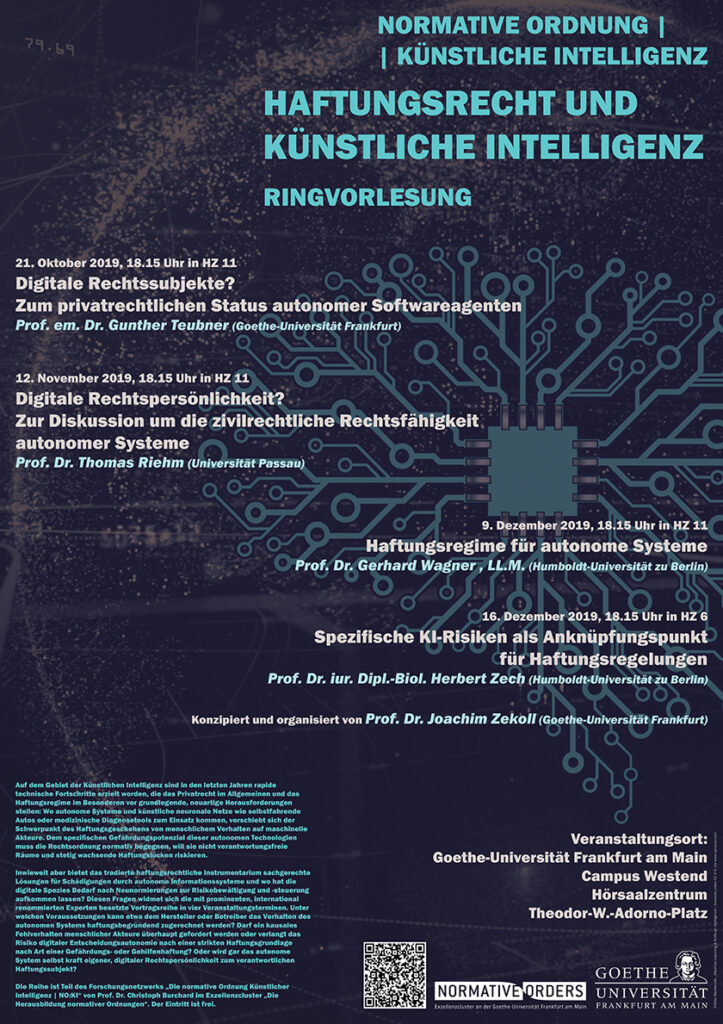
Democracy in crisis? Rupture, regression and resilience
Summer semester 2019
The impression of a crisis of democracy is so widespread in 2019 that it hardly needs justification: the erosion of the rule of law and liberal institutions, the populist uncertainty of the representative system, the new authoritarianisms and intensified geopolitical upheavals are leaving deep traces in the political self-image of our time.
The lecture series with outstanding experts from Germany and abroad will examine this topic from various disciplinary and theoretical perspectives with questions about the logic of the current decomposition, the expected institutional consequences and the possibility of a future restoration of democratic legitimacy. These discussions are thus also intended to contribute to the dispute about democracy, which – after striking high points in 1968 and 1989 – has been unleashed anew today.
After this crisis of democracy as we knew it, how should citizenship be organized, how can social participation be guaranteed and on which state and supranational levels is democracy even fundamentally feasible? The answers to these and other questions, to which the lecture series is dedicated, will also determine whether the decline of democracy must be accepted as irreversible at a certain point or whether it can – perhaps – emerge from the upheavals and disputes renewed and strengthened, using its own self-healing powers.
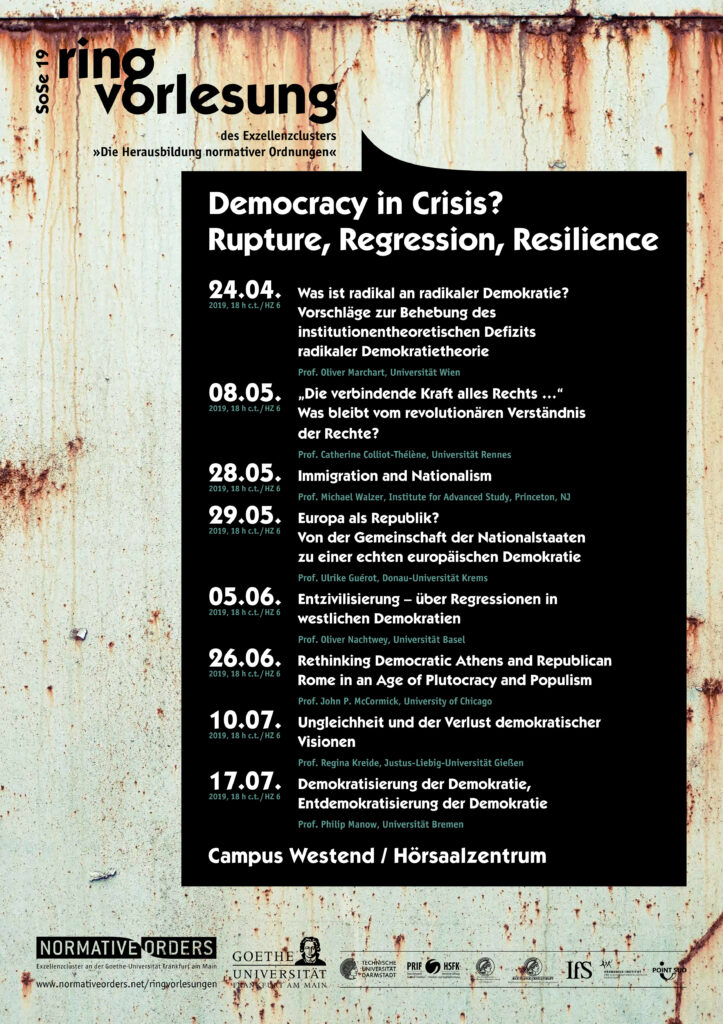
The End of Pacification? The Transformation of Political Violence in the 21st Century
Winter semester 2018/19
The history of the modern world has been told as a process of decreasing recourse to rampant violence: As a process of civilization that taught societies to tame human affects; as a process of legalization that led states and societies to regulate conflicts peacefully; and as a process of rising interdependence that made international conflict increasingly unprofitable. Even instances of massive collective violence, including world wars and the Holocaust, have been interpreted as deviant data points within an impressive macro-historical trend of pacification. This progressive narrative has been reinforced by the institutionalization of liberal norms and values, the global expansion of democracy and the peaceful termination of the Cold War.
While this diagnosis resonates with the Enlightenment ideas of modernization and rationalization, it runs the risk to oversee counter-evidence and underestimate developments that point to the opposite direction. New technologies allow for new kinds of weapons and the militarization of outer space and the internet. Non-state actors increasingly engage in mass-terrorism and new kinds of civil war. States adapt to these developments combining conventional and unconventional strategies in hybrid-warfare. What is more, the laws of war are increasingly violated and established institutions of regulating conflict are being questioned. Even the validity of formally agreed principles such as the illegality of violent conquest or the prohibition of chemical weapons are under pressure.
Do we witness the end of pacification? Is political violence transforming itself to the effect that it once again dominates political agendas? Or do we simply see the systemic contradictions inherent in the process of pacification which had all along consisted in the transformation and externalization rather than the overall reduction or even elimination of violence? Leading scholars from various disciplines aim to find answers to these questions in this lecture series.
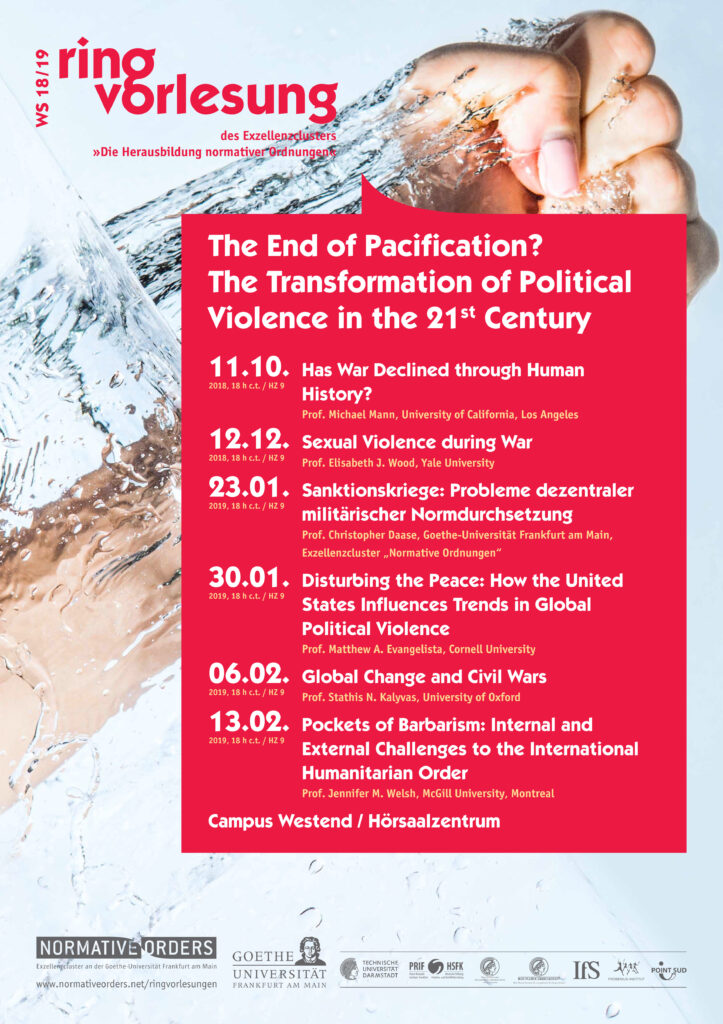
Criminal Justice between Purity and Pluralism – Strafrechtspflege zwischen Purismus und Pluralität
Summer semester 2017
Modeling Transformation
Summer semester 2016
Although the historical humanities are constantly dealing with phenomena of change, the discussion about how the phenomenon of “change” should be conceived in the humanities is surprisingly underdeveloped. What models of interpretation do we use to understand processes of change? How do our basic epistemological assumptions guide the interpretation of change? Of course, historical works constantly offer a variety of explanations as to why (less often: how) one historical formation became another historical formation. But the patterns of interpretation – the epistemological, methodological and often also political foundations of these explanations – usually remain implicit. This is all the more astonishing as it is precisely here that the bridge between empirical research and theoretical approaches could be successfully built. The aim of the lecture series, which the Cluster of Excellence is holding in cooperation with the Research Center for Historical Humanities and the Collaborative Research Centre “Discourses of Weakness and Resource Regimes”, is therefore to discuss models of change through contributions from various disciplines. The aim is to reassure ourselves of today’s historical thinking, but also to ask to what extent prognostic thinking is also possible.
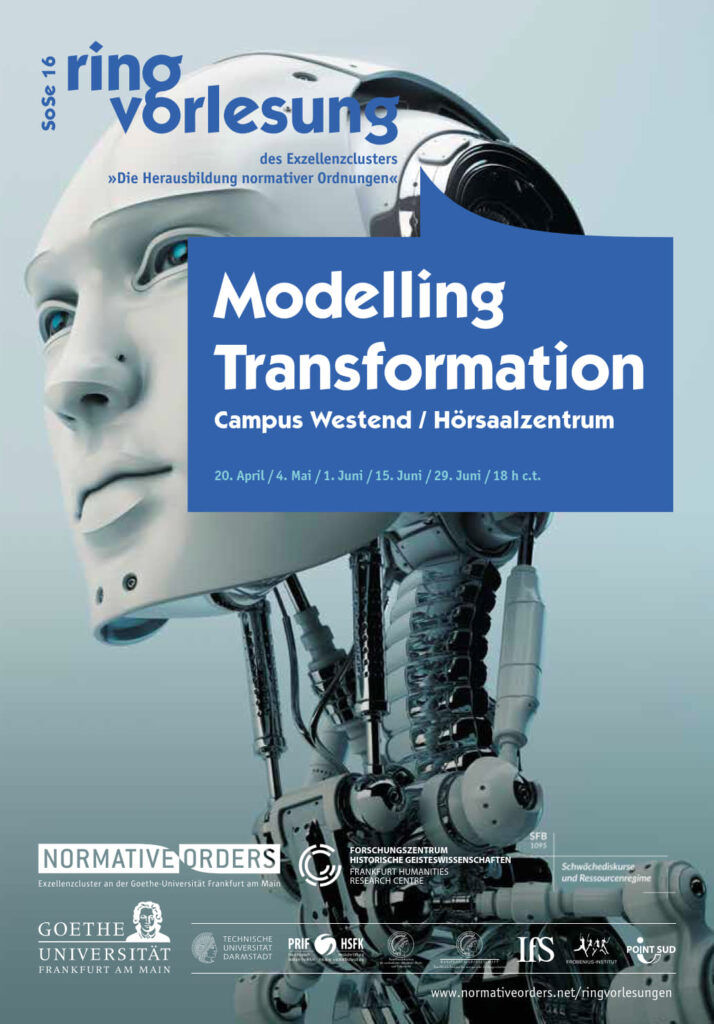
Conflicts of norms in pluralistic societies
Winter semester 2015/16
Cultural diversity is just as much a feature of modern pluralistic societies as differences in lifestyles, sexual orientations and ideological beliefs. The question is no longer whether homogenization or heterogenization is desirable (Appadurai), but rather how plurality can be shaped and conflicts of norms negotiated. In the social sciences and humanities, the possible effects of social pluralization (desolidarization, hybridization, new forms of communitization) are discussed just as controversially as proven solutions (e.g. tolerance, recognition, agreement on common values).
Disputes are currently being conducted primarily around religious and gender norms (e.g. headscarf debate, cartoon controversy) in order to justify inclusions and exclusions and construct collective identities. Fundamentally, the question arises as to the justification narratives for certain norms or conflicting frames of reference (human rights vs. cultural rights, weighing up different legal interests) in which norms are legitimized or delegitimized.
The lecture series will present and debate new theoretical and empirical findings on norm conflicts in pluralistic societies, also with regard to their potential to promote norm change and new forms of integrating differences.
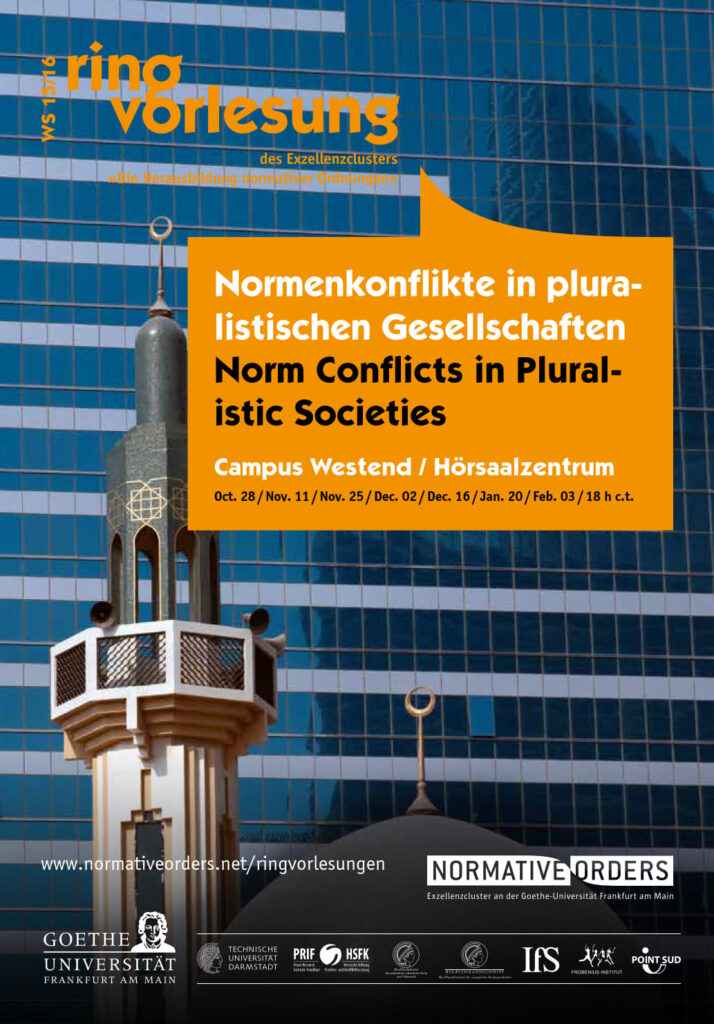
Theorizing Global Order
Summer semester 2015
“Order” is a central concept in the discipline of International Relations. However, in contrast to other concepts (such as “security”) it is surprisingly undertheorized. In this Lecture Series scholars with different backgrounds and theoretical preferences will offer their take on what it may mean to “theorize global order”.
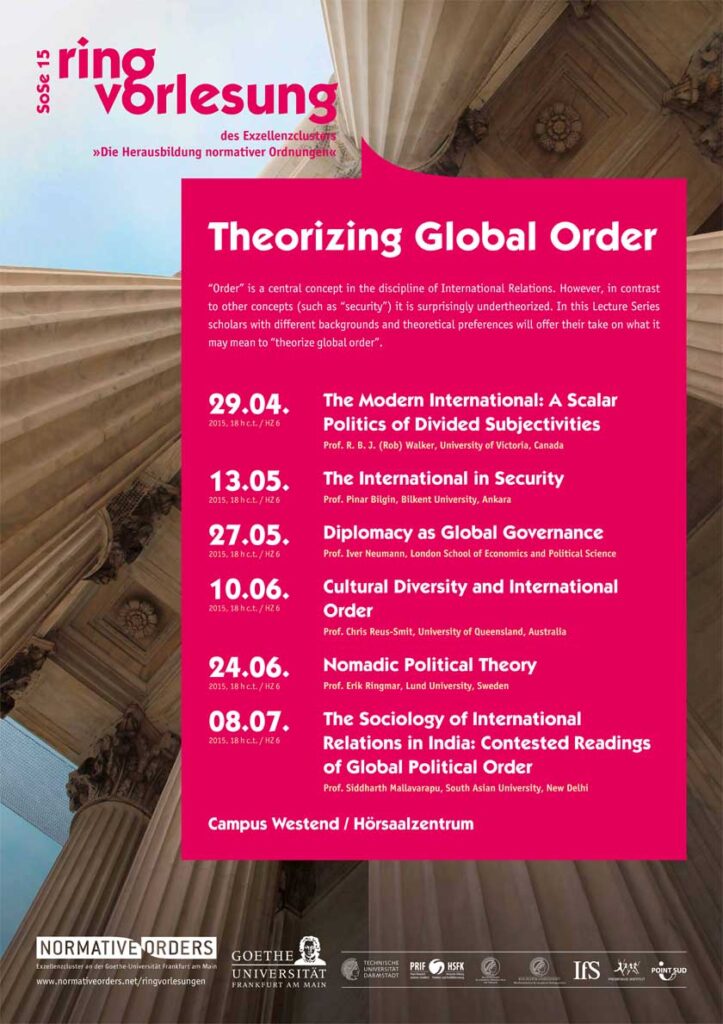
Translating Normativity: New Perspectives on Law and Legal Transfers
Winter semester 2014/15
Throughout history, law and legal knowledge were circulating between cultures, countries, and continents. Sometimes willingly adopted, sometimes forcefully imposed by powers from outside, the process of dealing with foreign law often changed not only the sources of law, but a whole structure of normative thinking. One might think of the reception of Roman law in Europe during the Middle Ages, the formation of derecho indiano in early modern Hispano-America or the adoption of European law in East Asia during the 19th century. In recent years, such processes could be observed in states in transition, for example in Eastern Europe.
As most normative orders, law is not only produced by politics, but it is rooted in language and traditions. Is it actually possible to translate norms? What happens when they are taken up by a different culture, having to operate in another language? How does their meaning shift during these processes, how do their function and even their normativity change?
The lecture series, which will try to find answers to these questions, is inspired by the concept of “cultural translation”. This term aims to supersede the notion of a linear give-and-take; instead, it emphasizes interactions and intermediate areas, internal dynamics, resistance and the “agency” of the actors. In a critical reflection of the traditional Eurocentric perspective, the concept of “translation” reminds us how complex, intertwined, and contested the adoption and re-production of foreign norms might be.
We do not only focus on legal normativity. While one lecture will explicitly discuss the translatability of law and legal norms, the other lectures shall deal with different forms of normativity as to be found in political concepts, religion and technology. Broadening the view in this way should enable us to compare normative orders and to examine how cultural translation actually “worked” in different fields. This might, eventually, produce a profounder understanding not only of law but also of normativity in general.
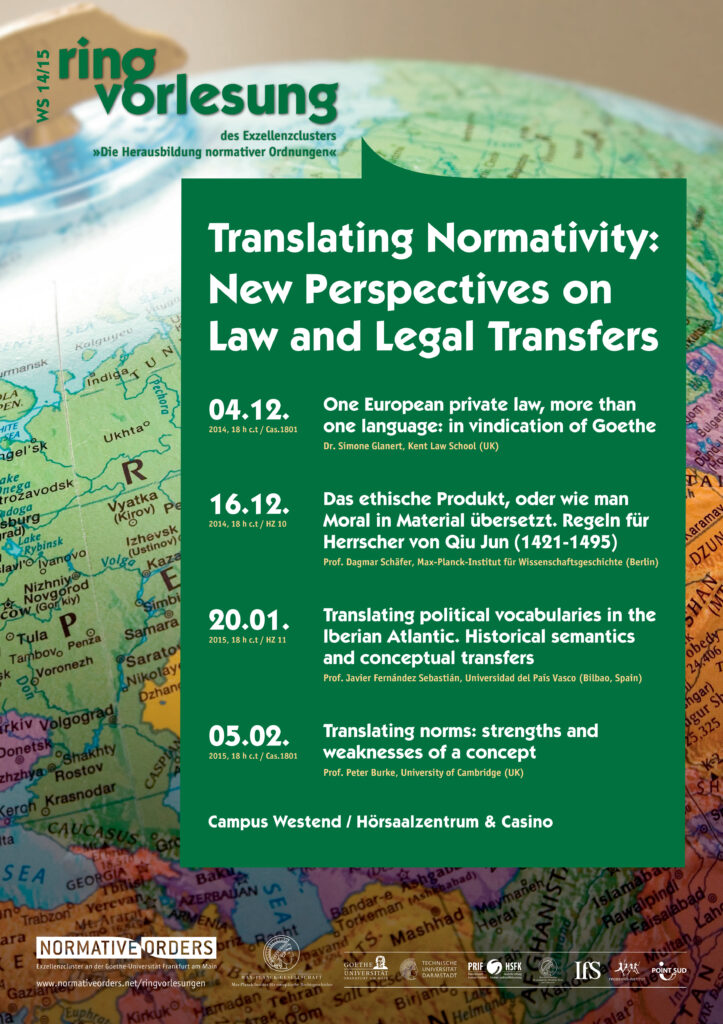
Legal studies in Frankfurt facing the challenges of the next 100 years – experiences and expectations
Summer semester 2014
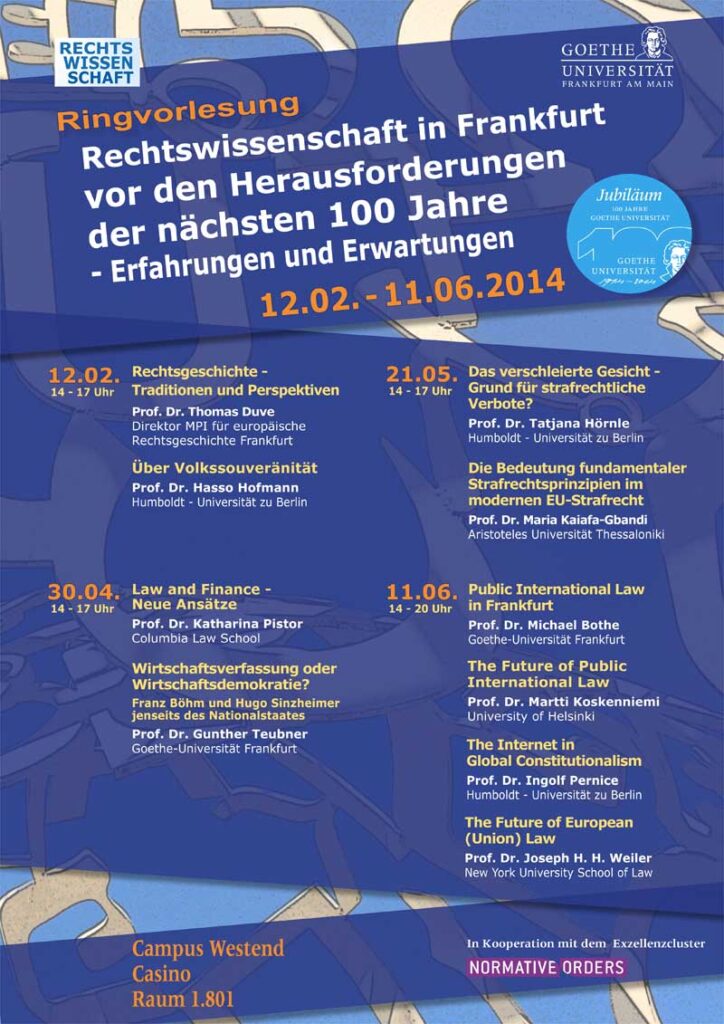
Beyond Anarchy: Rule and Authority in the International System
Winter semester 2013/14
The normative order of the international system is often described as anarchic in order to characterize a system that lacks an overarching authority that could resolve conflicts between the main actors in the system, traditionally nation states. With the rise of non-state actors and the spread of inter- and supranational organizations, the image of international politics has already changed in recent decades, but the attribution of anarchy persists. Although decisions are increasingly being made at supranational level or in informal clubs or private organizations, these developments are mostly seen as a form of delegation of decision-making authority by states that can be terminated at any time, but not as an expression of rule in the international system.
In contrast, the image that legal scholars have of international politics is quite different. They often view the international system as an order that is constituted in and through law and has been increasingly centered in the United Nations since the 19th century. Accordingly, they see “law” and not “power” as the central movens of international politics.
The lecture series takes up the tension between these two perspectives and poses a question that is equally relevant to both: What do authority and rule mean in the international system and how do they present themselves? While some see authority as linked to legitimacy, others emphasize precisely the ambivalent relationship between authority and legitimacy, as can be observed above all in forms of opposition and dissidence in the international system.
In order to be able to classify the change that the normative order of international politics is undeniably undergoing, leading representatives from political science, law and sociology are invited to discuss their perspectives on authority and rule in international politics.
Normativity and historicity: Frankfurt perspectives II
Summer semester 2012
“Normativity and historicity” marks a tense relationship. (Almost) every normative order claims to be both well-founded and valid everywhere and always. In contrast, any ethnologically or historically inspired view of the world is based on the premise that “cultures” and “epochs” each develop their own normative orders, which change more quickly or more slowly. Although all normative orders develop strategies of immunization against change, for dealing with other normative systems and for dissent, and can refer to the same texts over a long period of time, from this perspective they are therefore constantly in flux – especially as they are interpreted differently in detail by each individual in each place and translated into slightly different practices. This poses considerable problems for empirical research into normative orders, because every description of the change in normative orders is based on a mixture of observations (which are founded on traditions of varying density) on the one hand, and constructions and assumptions about what constitutes the respective order at its core on the other.
The lecture series deals with this problem using two types of examples: Moments of change in normative orders and constellations in which normative orders come into direct contact with each other and possibly come into conflict. In addition to the empirical description, it reflects on the problem of an ethnological or historical description of normative orders themselves. It thus continues, with a different emphasis, the presentation of the results of the first funding phase of the cluster, which began last semester with a more philosophical-political science view of normativity. Thematically, the Frankfurt historical and ethnological perspectives range from ancient Egypt to the present; geographically, they encompass the view of Europe as well as the view of relations between Europe and a world conceived as “non-European” or of postcolonial constellations. We very much hope that this (further) field of tension between multifaceted empiricism and systematic questioning will stimulate as many interested parties as possible to receive, discuss and think further about the results.
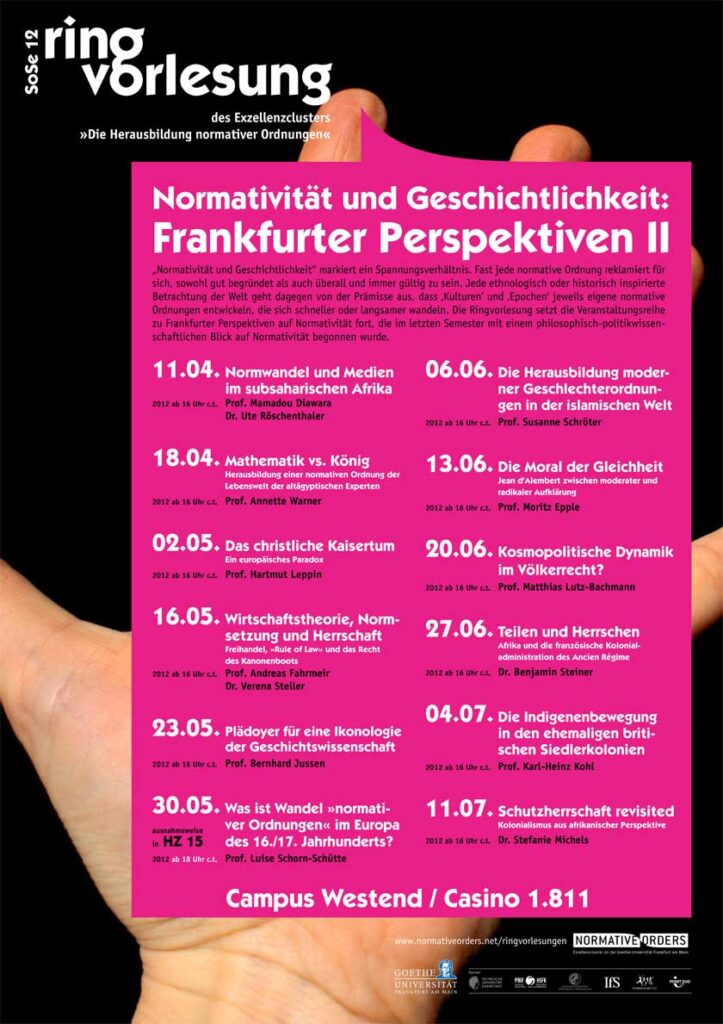
Normativity: Frankfurt perspectives
Winter semester 2011/12
Normativity is the term for an everyday phenomenon that is difficult to explain and raises a question: What is the force that makes us adhere to principles, norms and rules of various kinds? Normativity is a kind of binding without a tether, and the explanations of where it comes from range from self-referential considerations to social explanations and the assumption of objective values beyond the empirical world. These questions play a central role in the interdisciplinary research cluster “Formation of Normative Orders”. The event continues the lecture series “The Nature of Normativity” from the 2010/11 winter semester with perspectives from Frankfurt researchers.
Post-secularism
Summer semester 2011
Anyone thinking about the development of normative orders today cannot ignore the so-called “return of religion” in contemporary societies, not only in the West. Not that religions have ever disappeared, as the word “return” seems to suggest, but the religious dimension of social conflicts has become much more important in national contexts as well as globally in recent decades. If we think of the various discussions about fundamentalism and violence, about the supposed end or rather the beginning of multicultural societies and about questions of the intercultural binding nature of universal norms such as human rights, quite a few people see a return of religiously motivated struggles that were thought to be a thing of the past. These questions occupy us in various research projects as well as in central events. In this lecture series, renowned experts will explore the question of whether and in what sense we are living in a “post-secular” age. This term, introduced into the debate by Jürgen Habermas, raises the question of what role religion plays and should play in liberal and democratic, religiously pluralistic communities; in particular, it is about how it is possible to find a common political language between different religious, areligious and anti-religious convictions that clash in a society – and what learning processes are necessary in each case.
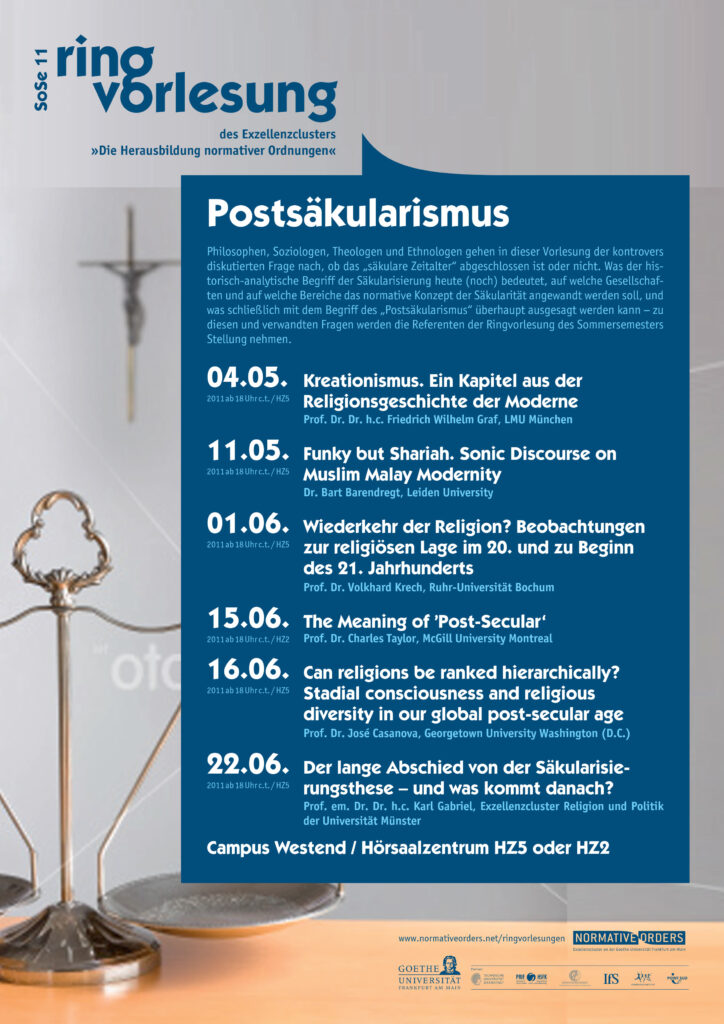
The Nature of Normativity
Winter semester 2010/11
Normativity is the most commonplace phenomenon, and yet one that is difficult to explain philosophically. It is the most commonplace because we see ourselves bound to a series of norms, values and rules in our thoughts and actions without being directly forced to do so – such as social conventions of politeness, an ethos of professionalism, bonds of friendship, promises to be kept and even general moral norms. Even in the case of legally binding norms, different explanations are given for their reasons for validity. The central question of normativity is where the binding force of such norms, values and rules comes from: from instrumental considerations, from social expectations, from autonomous self-commitment or from a normative reality beyond the empirical world that can perhaps only be explained metaphysically?
The philosophers who will give lectures as part of this lecture series, which is central to the Cluster of Excellence’s topic, are the most internationally renowned experts in this field. They will discuss the nature of normativity from different perspectives, thus creating a panorama of the state of the art in contemporary philosophy. Each lecture will be introduced by one of the speakers of the cluster
Non-Western Approaches to Justice and Peace
Summer semester 2010
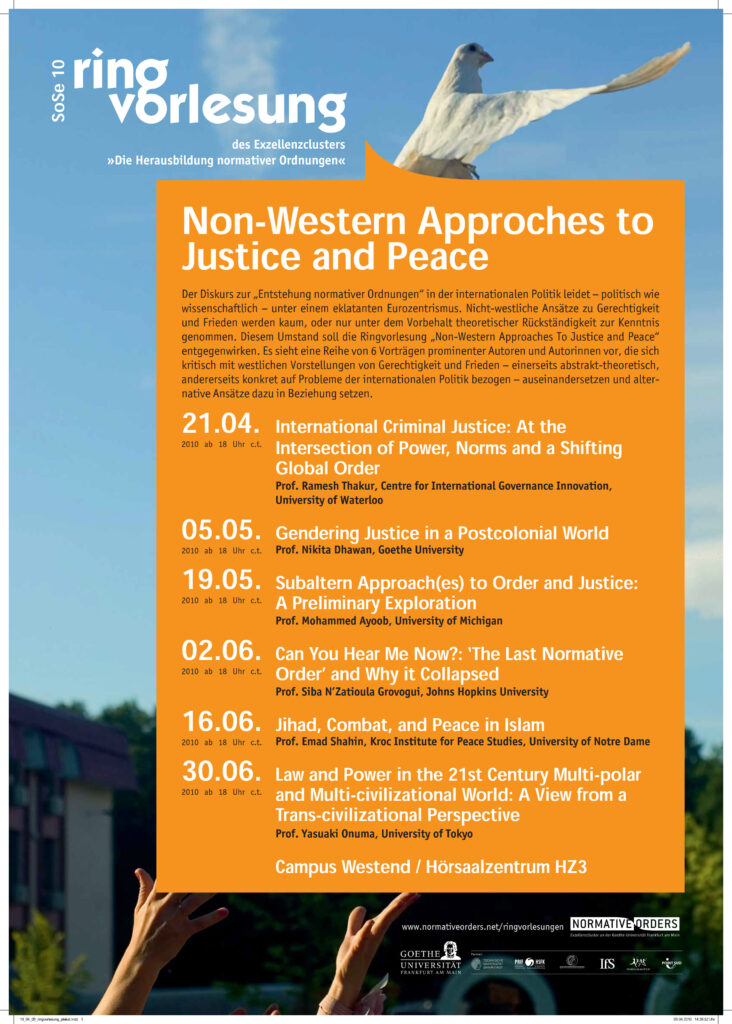
Law without a state? On the normativity of non-state lawmaking
Winter semester 2009/10


